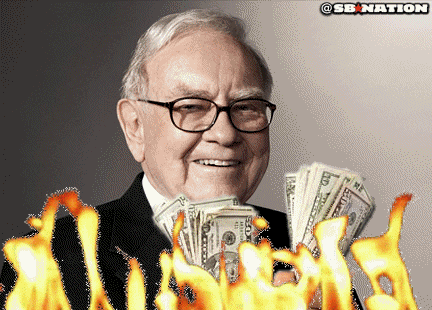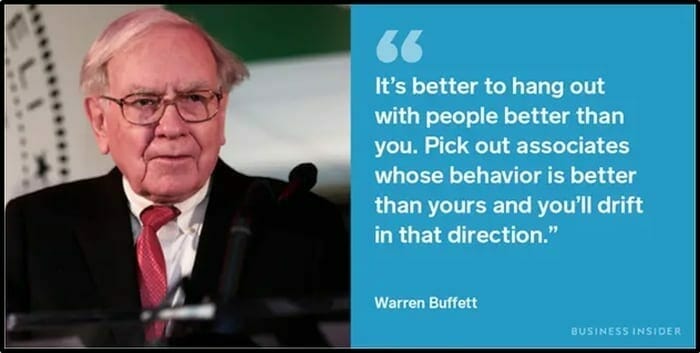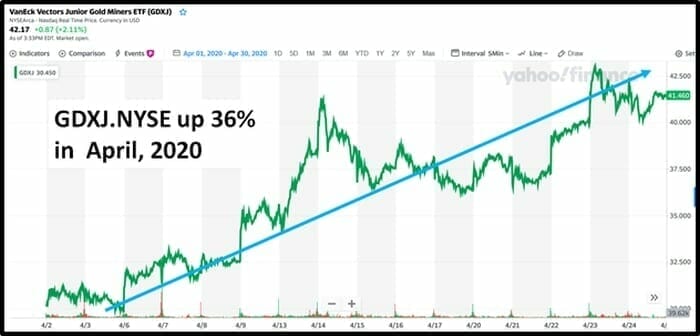True heroes are hard to come by.
Warren Buffett – the elderly CEO of the $430 billion Berkshire Hathaway (BRK-A.NYSE) – is one of my heroes.
Over the last 56 years, he’s been a spectacularly successful investor.
If you’d purchased $10,000 BRK-A shares in 1964 – you’d be worth $220 million today.
But Mr. Buffett’s investing savvy is not – to me – his central appeal.
To put it bluntly, uber-rich men tend to be jerks.
Example: one prominent businessman-turned-politician exhibits a basket of toxic traits: a self-confessed groper, the CEO of a fake charity, a liar who promotes violence, a tax cheat and a white supremacist.
Warren Buffett is an anti-jerk.
He had only one wife until her death in 2004.
He lives in quiet neighborhood of Omaha, Nebraska in a house he purchased for $31,500 in 1958.
Why not a fancy home in Bel Air with an infinity pool?
“I’m happy there,” Buffett told the BBC about his Nebraska crib, “I’d move if I thought I’d be happier someplace else.”
“A very rich person should leave his kids enough to do anything,” stated Buffett, “But not enough to do nothing.”
Buffett has pledged to give 99% of his wealth to charity.
This Saturday, Buffett addressed shareholders via live stream on Yahoo Finance.
The current economic crisis has delivered Berkshire a sharp slap in the face.
BRK reported a loss of USD $49.7 billion in Q1, 2020.
Berkshire stock is down about 20% this year. Despite a $116 billion war chest, Buffett has declined to buy back his own shares, stating that they probably aren’t a great bargain right now.
On Saturday, Buffett’s confirmed that Berkshire sold its entire stake in the country’s four largest airlines — American (AAL.NYSE), United (UAL.NYSE), Delta (DAL.NYSE) and Southwest (LUV.NYSE). Those four airlines are down an average of 8% today.
Passenger volumes are down more than 90%, compared with a year ago, according to industry group Airlines for America. 3,100 planes have been idled.
The coronavirus pandemic has turned Buffett bearish on the airline industry. “I wish them [the airlines] luck,” said Buffett.
Buffett’s bad bet on the airlines will not sully his reputation as an investing genius.
He’s banked enough good will to off-set 80 crap investing decisions this size.
That said, I believe Buffett is wrong about one very important issue.
“Nothing can basically stop America,” stated Buffett at Saturday’s virtual shareholder meeting. “The American miracle, the American magic has always prevailed and it will do so again.”
Buffett’s opinion (about the resiliency of the U.S. economy) has been right for six decades. Why wouldn’t it continue to be right?
Three reasons: debt, debt & debt.
America is broke.
Not I’m-switching-to-a-cheaper-vodka broke.
Giving-$10-hand-jobs-behind-the-liquor-store broke.
In 2019 – when Trump was bragging about “The Greatest Economy Ever” – the U.S. yearly deficit was $1.4 trillion ($9,000 per U.S. taxpayer).
The U.S. has zero funds.
When it runs a deficit, it just borrows – or prints – more money.
2019’s grim numbers are about to get a whole lot worse.
“Current policies add up to a 2020 budget deficit totaling between $4 trillion and $5 trillion,” states Bloomberg, “Which would equate to roughly 20% of GDP. That’s more than twice the size of the largest deficit run by the Obama Administration.”
Massive deficits might not be a problem if the U.S. had a skill-set, or resources, the rest of the world needs. But it doesn’t.
America’s greatest talent is shopping. This decadent activity generates a whopping 68% of the U.S. GDP. There are more shopping malls in the U.S. than high schools.
Total U.S. consumer debt is at $13.9 trillion. That includes mortgages, auto loans, student loans and credit cards.
Americans collectively carry $980 billion in credit card debt. On average, each household with a credit card carries $8,500 in credit card debt.
Despite this, American still spend $70 billion a year on pets, including must-own products like “Poop Freeze”.
This entrenched U.S. insolvency is likely to end in severe debasement of fiat currency (paper money).
If that happens, we recommend investing in hard assets like precious metals.
“A recent offering—Undervalued and underappreciated – our sub $100M market cap junior exploration company shortlist—was composed of companies with significant resources backstopping their valuations,” stated Equity Guru’s Greg Nolan on February 12, 2020.
Nolan: “Another recent offering—Gaining traction – our $100M-plus market cap junior exploration company shortlist—featured companies with a little more meat on the bone (companies further along the development curve).
This next shortlist features companies that are cheap by comparison. For the most part, they lack significant resources and are trading under the market’s radar—most haven’t caught a bid, though some have firmed up in price of late.
Note that some of the companies featured below have limited their groundwork in recent months to conserve cash, waiting for the tide to roll back in.
Conversely, some have raised cash in recent weeks/months and are looking to the future (a PP followed by a shiny new corporate presentation usually means things are about to get jiggy).
This is a real mixed bag, but the one thing these ExplorerCos all have in common is discovery potential.
The must-have criteria for this list:
- the company must have a project of merit—geological merit.
- the company must have a market cap of < $20M Cdn dollars.
- the company must be helmed by an experienced management team.
- the company must be located in a mining-friendly jurisdiction.
Once again, I’ll start in the Yukon Territories, then travel south, then head north-east.” – Greg Nolan.
In March, 2020 there was a nasty sell-off in gold equities. Since April 1, 2020 the gold junior gold ETF GDXJ.NYSE is up 36%.
Many of Nolan’s featured companies have doubled in the same time frame.
In the past six weeks, 31 million Americans have filed for unemployment. The unemployment rate has spiked from 3.5% to 20%. The GDP has fallen 4.8% in Q1, 2020, the largest contraction since the financial crisis.
“In World War II, I was convinced [that American economy would prevail],” stated Buffett. “I was convinced of this during the Cuban Missile Crisis, 9/11, the financial crisis.”
“You can bet on America,” added Buffett.
Indeed, you can.
But with all due respect to my beloved hero – I wouldn’t.
– Lukas Kane.




